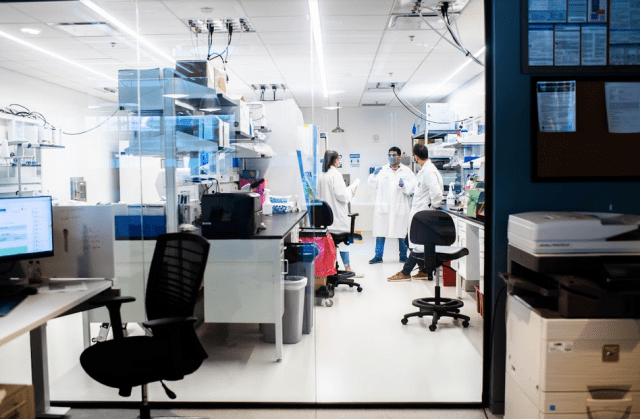Last year, the Richard K. Mellon Foundation announced that it was donating a staggering $100 million to create the BioForge, a massive factory for tiny things at Hazelwood Green. It’s intended to help Pittsburgh’s biosciences industry grow exponentially by providing a manufacturing facility for things like viral vectors that deliver genetic material and monoclonal antibodies.
If we’ve learned anything from the pandemic, it’s that modern vaccines and therapeutics — developed with these kinds of technologies — can arrive with miraculous speed, and save millions of lives. But deploying them at scale involves extremely specialized facilities.
Now ElevateBio, a Massachusetts-based medical tech company, will bring 172 full-time jobs (plus an estimated 900 construction jobs) to the BioForge. David Hallal, CEO and chairman of ElevateBio, says the company chose Pittsburgh as the home of its new location because it represents “the intersection of science, technology and talent.”

“To realize our vision of transforming the cell and gene therapy field for decades to come, broadening our footprint across metropolitan areas is a key priority for us, and we are thrilled that the University of Pittsburgh will be home to one of our BaseCamp facilities,” says Hallal.
The University of Pittsburgh is a leader in the research department, but Pitt Senior Vice Chancellor for the Health Sciences, Dr. Anantha Shekhar says the “missing ingredient has been access to high-quality process science and manufacturing capabilities.”
“As we position ourselves to become the next global hub for life sciences and biotech, we were in search of the right partner to help us realize our vision, and ElevateBio’s expertise and reputation in cell and gene therapy made them the perfect partner to accelerate our ability to build our biomanufacturing center of excellence,” says Shekhar.
ElevateBio is investing $40 million, on top of R.K. Mellon’s $100 million in the 250,000-square-foot BioForge at Hazelwood Green.
“This partnership between two national life-science powerhouses – the University of Pittsburgh and ElevateBio — is a consequential step forward in realizing our shared vision to make Pittsburgh a national and international biomanufacturing destination,“ says Sam Reiman, director of the Richard King Mellon Foundation.
ElevateBio has made a 30-year commitment to a manufacturing presence in Pittsburgh.
“ElevateBio will be a major anchor at Hazelwood Green,” notes Mark Anthony Thomas of the Pittsburgh Regional Alliance. “This cutting-edge development is rapidly becoming home to companies and other organizations driving innovation in AI and robotics; high-value, deep-tech enabled manufacturing; and life sciences. Every one of these is shaping the future for not only this region, but for the world, and it’s remarkable to say that’s happening here in Pittsburgh.”

Astrobotic’s CubeRover selected by NASA
On the moon, nighttime is no joke. Temperatures can drop to minus-200 degrees Celsius, which can destroy sensitive equipment like batteries and electronics.
Pittsburgh’s own space robotics pioneer Astrobotic created CubeRover for exactly this type of mission. It’s hardened against the perils of the lunar night, which is why it was selected by NASA’s Small Business Innovation Research Sequential Phase II program.
Rovers also need to be capable of driving long distances away from their host landers. This poses a challenge for communications if the rover’s host lander is over the horizon and unable to share a communication relay between Earth and the rover. CuberRover will test its communication relay abilities on an upcoming Astrobotic lander mission to the moon.
“This mission has the potential to usher in a new era of robust lunar robotics where instruments and payloads can survive months to even years on the Moon’s surface,” says Mike Provenzano, Astrobotic’s director of Lunar Surface Systems. “CubeRover will survive longer and drive farther than any lunar rover in its class with this flight, taking Astrobotic a major step forward in opening the moon to sustained long-term robotic operations.”
If you want to learn more about Astrobotic and space, the company is opening the Moonshot Museum at its Mission Control facility on the North Side on Oct. 15. They’re calling it the “world’s first museum focused on space career readiness.”

